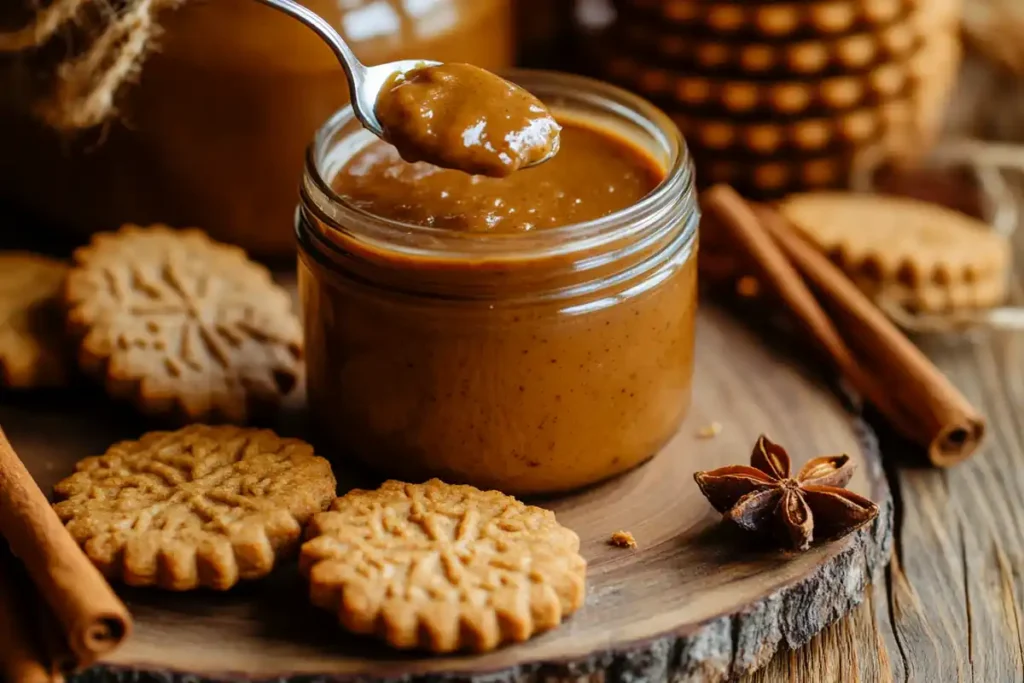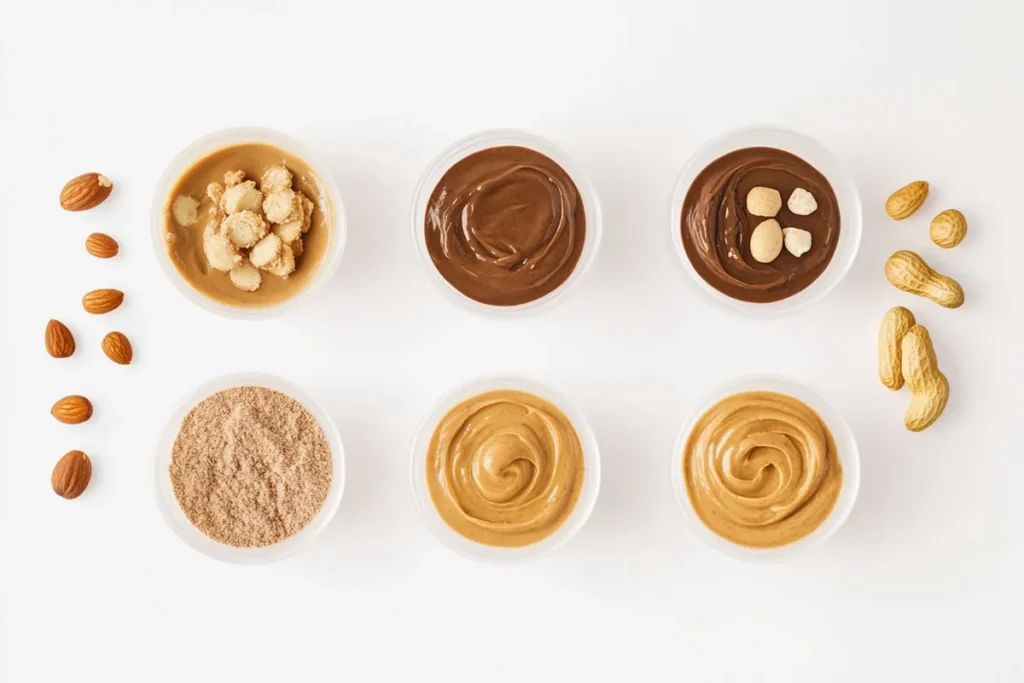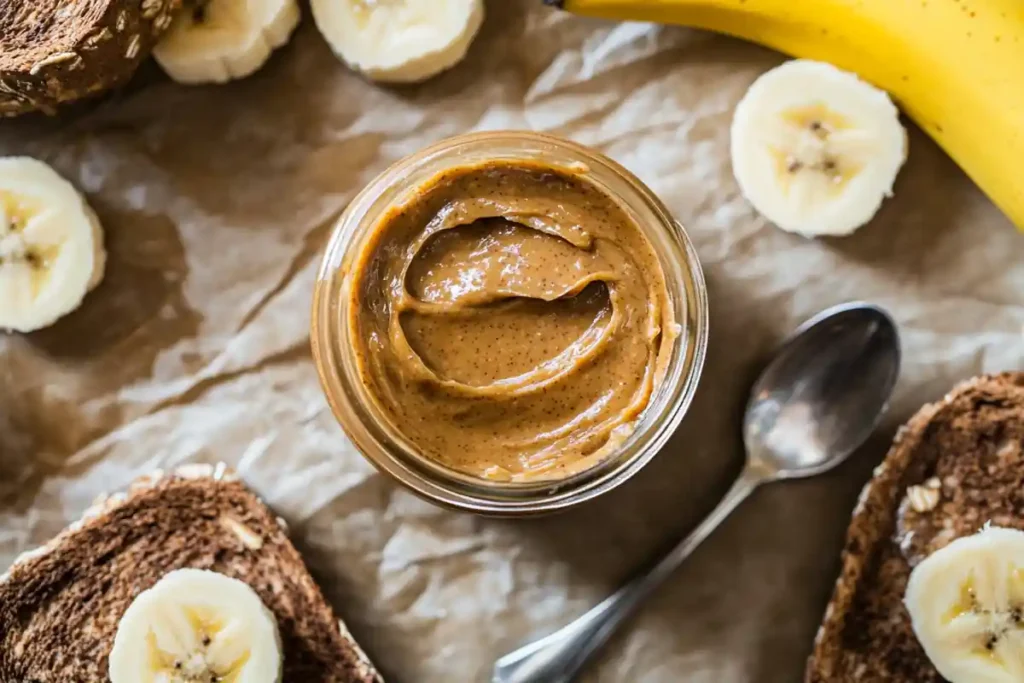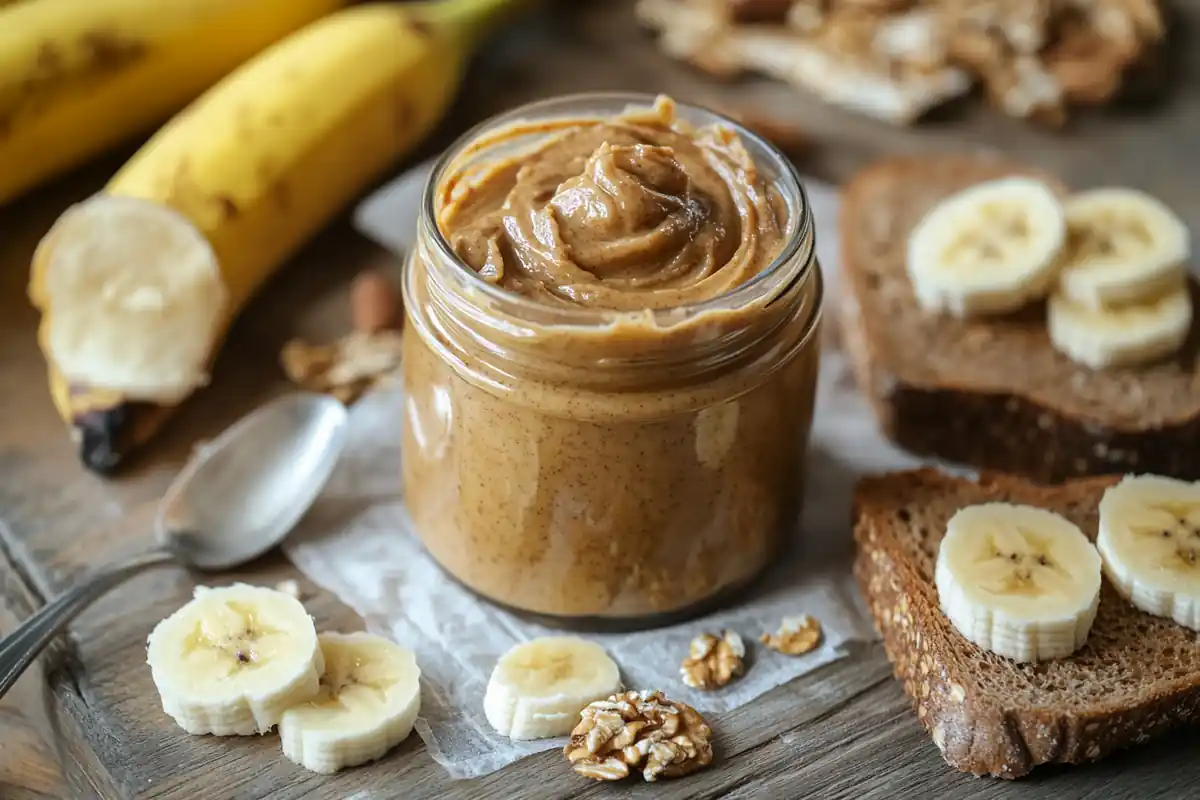Cookie butter has taken the world by storm, becoming a beloved treat for its rich, indulgent flavor. But as its popularity grows, so does the question: Is cookie butter healthy? In this article, we’ll dive deep into this delicious spread’s origins, nutritional profile, and health implications. Whether you’re a cookie butter enthusiast or just curious, we’ll explore everything you need to know—from its ingredients to how it fits into a balanced diet. By the end, you’ll clearly understand whether this sweet treat deserves a spot in your pantry.
What Is Cookie Butter?
The Origins of This Sweet Spread
Cookie butter, also known as speculoos spread, traces its roots back to Belgium and the Netherlands. It’s made from speculoos cookies, which are spiced, crunchy biscuits traditionally enjoyed during the holidays. Over time, these cookies were ground into a smooth, creamy spread, and cookie butter was born. Today, it’s a global sensation, often compared to other spreads like peanut butter or Nutella. However, unlike its nut-based counterparts, cookie butter has a unique flavor profile—think warm spices like cinnamon, nutmeg, and ginger, with a sweet, caramel-like undertone.

Ingredients in Cookie Butter
So, what exactly goes into this irresistible spread? The primary ingredient is, of course, speculoos cookies. These are blended with oils (like palm or vegetable oil) and sugar to create a smooth, spreadable consistency. Some brands also add additional flavorings or preservatives.
When comparing homemade cookie butter to store-bought versions, the difference lies in control over ingredients. Homemade recipes often allow for reduced sugar and healthier oil choices, while commercial options tend to prioritize shelf stability and mass appeal. The key takeaway is that cookie butter is a high-sugar, high-fat spread—something to keep in mind as we explore its nutritional impact.
Nutritional Profile of Cookie Butter
Breaking Down the Calories and Macros
Regarding cookie butter, the first thing to note is its calorie density. A typical serving (about 2 tablespoons) packs around 200 calories, similar to other spreads like peanut butter or Nutella. However, the macronutrient breakdown tells a different story.
Cookie butter is high in fat, with most of it coming from added oils. A single serving contains about 12 grams of fat, including a mix of saturated and unsaturated fats. While fats are essential for energy, the type and amount matter. Additionally, cookie butter is loaded with sugar—around 10-12 grams per serving. That’s nearly 3 teaspoons of sugar, which can add up quickly if you’re not careful.
On the flip side, cookie butter is low in protein and fiber, offering less than 1 gram of each per serving. This makes it less filling than nut-based spreads, which often provide more protein and healthy fats.
Vitamins and Minerals: What’s Missing?
If you’re looking for a nutrient powerhouse, cookie butter might not be your best bet. Unlike almond butter or sunflower seed butter, which are rich in vitamins like E and minerals like magnesium, cookie butter offers little in the way of micronutrients.
Some versions may contain trace amounts of iron or calcium, depending on the ingredients used. However, these levels are minimal and shouldn’t be relied upon as a significant source of nutrition.
So, is cookie butter healthy from a nutritional standpoint? While it’s undeniably delicious, its high sugar and fat content and a lack of essential nutrients make it more of an occasional treat than a health food.
Pros and Cons of Eating Cookie Butter
Potential Health Benefits of Cookie Butter
Let’s start with the positives. While cookie butter isn’t a superfood, it does have a few redeeming qualities. For one, it’s a mood booster. The rich, indulgent flavor can satisfy cravings and make healthy eating feel less restrictive. After all, enjoying your food is an important part of a balanced diet.
Additionally, when consumed in moderation, cookie butter can be part of a healthy lifestyle. A small serving can add flavor to oatmeal, smoothies, or whole-grain toast, making it easier to stick to nutritious meals.
Health Risks of Eating Cookie Butter
On the flip side, the downsides of cookie butter are hard to ignore. Its high sugar content can lead to blood sugar spikes, making it a poor choice for people with diabetes or insulin resistance. Over time, excessive sugar intake can also contribute to weight gain, inflammation, and even chronic diseases like heart disease.
The high-fat content, particularly saturated fats, is another concern. While fats are essential, too much-saturated fat can raise cholesterol levels and increase the risk of heart problems.
Cookie Butter vs. Other Spreads

Compared to peanut butter or almond butter, cookie butter falls short in terms of nutrition. Nut-based spreads offer more protein, healthy fats, and essential nutrients, making them a better choice for everyday consumption. Even Nutella, often criticized for its sugar content, contains some hazelnuts, which provide some nutritional value.
So, is cookie butter healthy? The answer depends on how you use it. As an occasional treat, it can be part of a balanced diet. But if you’re looking for a spread to eat daily, there are healthier options available.
How to Incorporate Cookie Butter into a Healthy Diet
Portion Control Tips
Let’s face it—cookie butter is hard to resist. But the key to enjoying it without derailing your health goals is portion control. A standard serving size is about 1-2 tablespoons, which is enough to satisfy your sweet tooth without going overboard.
Try pre-portioning your cookie butter into small containers or using a measuring spoon to make it easier. You can also pair it with nutrient-dense foods like whole-grain toast, oatmeal, or sliced apples. This way, you get the best of both worlds: a tasty treat and a balanced snack.
Another tip is to savor it slowly. Let the rich, spiced flavor linger on your palate, and you’ll find that a little goes a long way.
Healthier Alternatives to Cookie Butter
If you want a healthier way to enjoy cookie butter, consider making your own at home. By using whole-grain cookies, natural sweeteners like honey or maple syrup, and healthier oils like coconut oil, you can create a version that’s lower in sugar and higher in nutrients.
For those who prefer store-bought options, look for brands with simpler ingredients and less added sugar. Some companies even offer protein-enriched or low-sugar versions of cookie butter, which can be a better choice for regular consumption.
So, is cookie butter healthy when made with better ingredients? It can be a step in the right direction, but moderation is still key.
Creative Ways to Use Cookie Butter in Recipes
Sweet Treats with Cookie Butter
If you’re wondering how to use cookie butter beyond spreading it on toast, the possibilities are endless! For instance, you can swirl it into brownie batter, mix it into pancake batter, or use it as a filling for cookies. Its rich, spiced flavor pairs perfectly with chocolate, bananas, and even coffee.
Another fun idea is to drizzle melted cookie butter over ice cream or blend it into milkshakes. These sweet treats are perfect for special occasions but remember to enjoy them in moderation to keep your diet balanced.
Savory Twists with Cookie Butter
Believe it or not, cookie butter can also work in savory dishes! For example, you can use it as a glaze for roasted vegetables like carrots or sweet potatoes. Its warm spices add a unique depth of flavor that complements the natural sweetness of these veggies.
You can also mix a small amount into marinades for meats like chicken or pork. The result is a sweet-and-savory dish that’s sure to impress your dinner guests.
The Environmental and Ethical Impact of Cookie Butter
Sustainability of Ingredients
When asked Is cookie butter healthy? it’s also worth considering its environmental impact. Many commercial cookie butter use palm oil, which has been linked to deforestation and habitat destruction. If sustainability matters to you, look for brands that use certified sustainable palm oil or alternative oils.
Additionally, the production of sugar and other ingredients can have a significant carbon footprint. Choosing locally sourced or organic ingredients for homemade cookie butter can help reduce this impact.
Ethical Considerations
Another factor to consider is the ethical practices of the brands you buy. Some companies prioritize fair trade practices, ensuring that farmers and workers receive fair wages. By supporting these brands, you can enjoy your cookie butter guilt-free, knowing it aligns with your values.
FAQs About Cookie Butter
Gluten-Free Options for Cookie Butter Lovers
Traditional cookie butter is made from speculoos cookies, which usually contain wheat flour. This means it’s not gluten-free. However, some brands offer gluten-free versions made with alternative flour like rice or almond flour. Always check the label if you have a gluten intolerance or celiac disease.
Is It Suitable for a Vegan Lifestyle?
Most cookie butter is vegan-friendly, as it’s made from plant-based ingredients like cookies, oil, and sugar. However, some brands may include dairy or other animal-derived additives, so it’s important to read the ingredients list carefully.
Shelf Life and Storage Tips
Cookie butter can last several months when stored properly in a cool, dry place. Once opened, keeping it in the refrigerator is best to maintain freshness. On the other hand, homemade versions should be consumed within a few weeks and stored in the fridge.
How Does It Compare to Nutella?
When comparing cookie butter to Nutella, both are high in sugar and fat. However, Nutella contains hazelnuts, which provide some protein and healthy fats, giving it a slight nutritional edge. That said, neither is a healthy food, and both should be enjoyed in moderation.
Can You Enjoy It While Losing Weight?
Yes, but with caution. While cookie butter is calorie-dense, you can still enjoy it as part of a weight-loss plan if you stick to small portions and balance it with healthier foods. For example, spread a thin layer on whole-grain toast or mix a teaspoon into your morning oatmeal.
Allergen Information to Keep in Mind
Most cookie butter contains wheat (gluten) and may be processed in facilities that handle nuts, making it unsuitable for those with certain allergies. Always check the label for allergen information, and look for gluten-free or nut-free options if needed.
Conclusion – Should You Eat Cookie Butter?
Final Thoughts on Cookie Butter and Health

So, is cookie butter healthy? The answer isn’t a simple yes or no. While it tastes undeniably delicious and brings joy to your taste buds, it doesn’t pack much nutritional value. With its high sugar and fat content, you should enjoy cookie butter in moderation as an occasional treat rather than a daily staple.
That said, you don’t need to feel guilty about indulging now and then. After all, food should bring joy, and a small serving of cookie butter can fit into a balanced diet. The key lies in pairing it with nutrient-dense foods and practicing portion control.
If you want a healthier alternative, try making your own cookie butter at home or choose brands with simpler, cleaner ingredients. Remember, balance is everything—mindfully enjoy your cookie butter and savor every bite!

